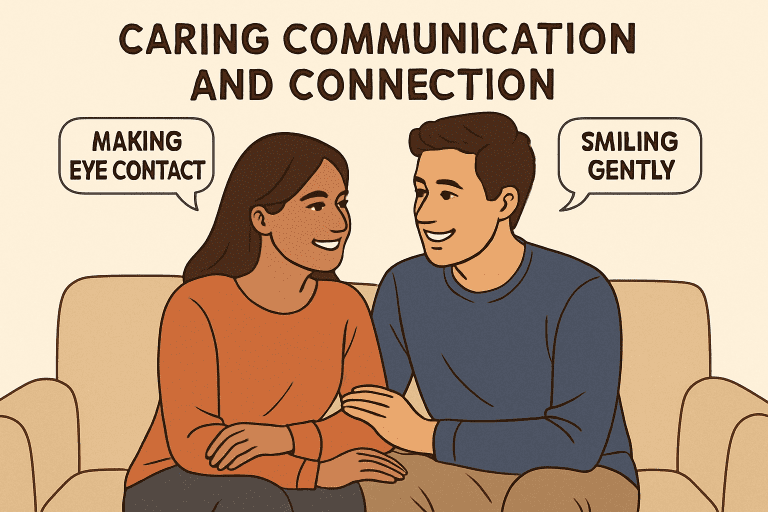Communication Skills for Couples: Building Trust and Connection

Effective communication skills for couples forms the backbone of every thriving relationship. When partners express their ideas, worries, and dreams openly, it fosters genuine understanding and deepens emotional intimacy. Couples facing communication obstacles often find that resources can offer the support needed to heal rifts and restore trust. Establishing solid communication habits makes it easier to resolve misunderstandings, address shared goals, and support one another through life’s ups and downs.
Without consistent and open dialogues, miscommunication can easily breed resentment, mistrust, or emotional distance. Investing time and care into growing healthy communication skills helps ensure each partner feels heard and truly understood and valued. Whether you are just beginning a relationship or have years of shared history, prioritizing clear and kind communication is key to protecting the love and harmony you cherish, and resources like couples therapy in Chicago can provide additional guidance for strengthening those bonds.
Importance of Effective Communication
A relationship thrives when both individuals express feelings, boundaries, and needs honestly and respectfully. Effective communication involves speaking and being present and receptive when your partner shares something personal. Couples can avoid assumptions and foster a deeply connected partnership by prioritizing open dialogues and clarifying intentions. This process builds a foundation of security, emotional resilience, and mutual growth.
Active Listening
Active listening focuses on your partner’s words, tone, and body language. This means listening to understand, rather than to respond. When couples give one another full attention, it sends the crucial message: “You matter to me.” Rephrasing what your partner has shared, validating their emotions (“It sounds like you’re really frustrated”), and withholding judgment demonstrate empathy and reduce the risk of conflict escalation. Developing active listening improves communication and overall relationship satisfaction.
Using “I” Statements
Using “I” statements, such as “I feel” or “I need,” enables you to discuss your experiences without blaming or criticizing your partner. Rather than saying, “You never listen,” try, “I feel ignored when my thoughts aren’t acknowledged.” This subtle shift encourages compassion, makes it easier for your partner to hear you, and lays the groundwork for solutions. Over time, “I” statements reduce defensiveness, allowing for more constructive, emotionally safe conversations.
Nonverbal Communication
An estimated 70% of communication happens nonverbally—through eye contact, facial expressions, posture, and gestures. Nonverbal signals can reinforce, contradict, or even replace what’s spoken. Holding hands during a tough discussion, using gentle touch, or maintaining engaged eye contact can communicate warmth and understanding more powerfully than words alone. Paying close attention to these cues and aligning them with spoken messages ensures clarity and emotional cohesion.

Emotional Intelligence
Emotional intelligence—understanding, managing, and responding to emotions—is critical in relationship health. High emotional intelligence fosters patience, compassion, and flexibility when navigating each other’s moods and triggers. Regular emotional check-ins, mutual goal-setting, and joint mindfulness exercises help couples identify patterns and become more conscious of how their feelings influence their behavior. Building this skill together leads to a deeper, more resilient emotional connection. The Gottman Institute provides evidence-based resources and exercises for couples looking to boost their awareness.
Conflict Resolution
Every couple faces conflict, but how disagreements are managed determines the strength of the relationship. Effective conflict resolution is based on curiosity (“Help me understand why this is important to you?”) and a shared commitment to solve problems together instead of “winning.” Discussing issues calmly, taking breaks when emotions run high, and focusing on underlying needs rather than past faults helps couples tackle disagreements as a team. A willingness to compromise, apologize, or even agree to disagree respectfully is vital in maintaining harmony and growing together.
Building Trust Through Transparency
Transparency means willingly sharing your thoughts, intentions, and experiences, even when it feels vulnerable. Keeping your partner informed about significant changes, discussing fears or insecurities, and admitting mistakes builds safety and trust. Consistently following through on promises, communicating proactively, and reinforcing your commitment with openness assures your partner that they can rely on your honesty. Over time, transparency nurtures a bond rooted in genuine security and deep intimacy.
Seeking Professional Guidance
If communication issues persist and can’t be resolved alone, seeking professional help is wise. Couples therapy provides a safe space to learn new communication skills, uncover patterns, and address long-standing problems with a professional’s support. Therapists customize their approach for each couple, strengthening bonds and relationship satisfaction. By adopting effective communication habits, couples can build a resilient relationship that endures challenges and shares joys. Lasting love, growth, and understanding are possible when partners commit to maintaining open, kind, and honest communication.
Moving Forward Together
Effective communication is the foundation of a strong marriage to avoid relationship stress. By practicing openness, active listening, and emotional intelligence, couples create an environment where trust and connection can flourish. Whether it’s through small daily gestures of nonverbal support, navigating conflicts with patience, or seeking professional guidance when challenges arise, partners who commit to intentional communication build resilience in their bond. Ultimately, relationships thrive not because they are free of difficulties, but because they approach one another with honesty, empathy, and a shared dedication to growth.

